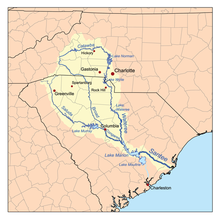South Carolina v. North Carolina
By a 5–4 vote, the Court held that an interstate water authority and the Duke Energy Corporation could intervene, while ruling unanimously that the city of Charlotte, North Carolina, could not.
[2] The Court appointed Kristin Linsley as the special master to review the evidence and determine the equitable apportionment of the river's water.
[1] Linsley, a San Francisco litigation partner and former law clerk to Justice Antonin Scalia, was the first woman appointed by the Supreme Court to serve in that role.
While Charlotte was one of the governmental bodies permitted to divert water from the Catawba, the Court found that their interests did not differ from the state as a whole.
As a result, Alito wrote, "respect for 'sovereign dignity' requires us to recognize that North Carolina properly represents Charlotte in this dispute over a matter of uniquely sovereign interest.
